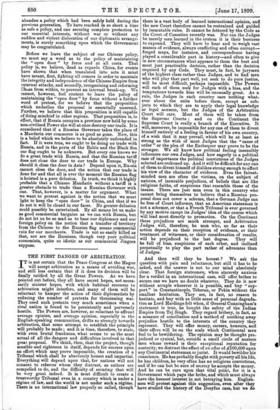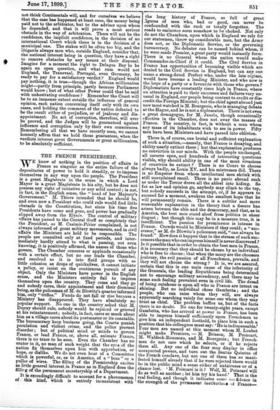11:11, FIRST DANGER OF ARBITRATION.
IT is not certain that the Peace Congress at the Hague will accept arbitration as a means of avoiding war, and still less certain that if it does its decision will be finally ratified by all the Great Powers. As we have pointed out before, they all have secret hopes, not neces- sarily sinister hopes, with which habitual recourse to arbitration might interfere, and many of them will be reluctant to hamper the action of their diplomatists by reducing the number of pretexts for threatening war. They need such pretexts very much sometimes when a rival nation is found to be persistently and perversely hostile. The Powers are, however, so reluctant to affront average opinion, and average opinion, especially in the English-speaking communities, drifts so strongly towards arbitration, that some attempt to establish the principle will probably be made ; and it is time, therefore, to state, with even brutal frankness, what seems to us the most actual of all the dangers and difficulties involved in that great proposal. We think, then, that the project, though sensible and righteous in itself, depends for success upon an effort which may prove impossible, the creation of a Tribunal which shall be absolutely honest and impartial. Everything will depend upon that, for nations will not consent to referees whom they distrust, as suitors are compelled to do, and the difficulty of securing that will be very great indeed. It is most difficult to create a trustworthy Tribunal even in a country which is under a regime of law, and the world is not under such a regime. There is no international law properly so called, though there is a vast body of learned international opinion, and the new Court therefore cannot be restrained and guided by immutable rules. It cannot be fettered by the Code as the Court of Cassation recently was. Nor can the Judges be merely men learned in the system it is their business to expound. They will have to hear and to weigh vast masses of evidence, always conflicting and often corrupt— forged maps, for instance, and correspondence having played a considerable part in history—and often to give in new circumstances what appears to them the best and most just practicable decision, rather than the decision required by any Code. They must, in fact, be jurymen of the highest class rather than Judges, and to find men who will play that part well, yet seek to do pure justice, will be most difficult, perhaps impossible. The Powers will each of them seek for Judges with a bias, and the temptations towards bias will be unusually great. As a rule, the Judges in each country care nothing what. ever about the suits before them, except as sub. jects to which they are to apply their legal knowledge or legal acumen, but the Judges of the Arbitration Court will care. Most of them will be taken from the Supreme Courts ; and on the Continent the Supreme Court is really a branch of the Executive. It will, moreover, be impossible for any one of them to divest himself entirely of a feeling in favour of his own country, of a wish that it may prevail, which will be at least as strong as the wish of most Judges that the "cause of order " or the plea of the Exchequer may prove to be the stronger. We all know how political feeling insensibly influences our own Judges, and how eagerly in a political case of importance the political convictions of the Judges selected are reckoned up. And it will be difficult for any one of them to divest himself of dislikes strong enough to affect his view of the character of evidence. Even the fairest- minded men are often the victims, on the subject of nations, of incurable prejudices, of beliefs that are like religious faiths, of suspicions that resemble those of the insane. There are just men even in this country who cannot bring themselves to believe that a Russian pro- posal does not cover a scheme, that a German Judge can be free of Court influence, that an American statesman is not a schemer, or that a French Tribunal is ever governed by any motive except its Judges' idea of the course which will lead most directly to promotion. On the Continent these prejudices are much stronger, and Arbitration Judges will, therefore, be men who, so far as their action depends on their reception of evidence, or their treatment of witnesses, or their consideration of results, will be prejudiced to the last degree. They will be full of bias, suspicious of each other, and inclined perpetually to play the part rather of advocates than of Judges.
And then will they be honest ? We ask the question with pain and reluctance, but still it has to be asked, and the answer is not to our mind absolutely clear. That foreign statesmen, when sincerely anxious for a verdict in an international case, will offer bribes to secure one we have no doubt whatever. They do it now without scruple wherever it is possible, and buy " sup- port" in Constantinople, Teheran, or Pekin without the smallest hesitation. They see, in fact, no reason to hesitate, and buy with as little sense of personal degrada. tion as Lord Hardinge felt when, if General Cunningham'', statement is true, he bought the safety of the Indian Empire from Tej Singh. They regard bribery, in fact, as a. measure of conciliation and a method of soothing away prejudice hostile to the interests of the country they represent. They will offer money, careers, honours, and their offers will be on the scale which Continental men feel to be bewildering. The opinion may be thought pre. judiced or cynical, but, outside a small circle of austere men whose reward is their exceptional reputation for austerity, we distrust the effect of an offer of £100,000 upon any Continental statesman or jurist. It would bewilder his conscience. He has probably fought with poverty all his life, he has children, he very often has no religious convictions, and if he can but be sure of secrecy he accepts the money. And he can be sure upon that vital point, for it is a, Government which pays the bribe, and which must always have the keenest interest in not betraying him. English- men will protest against this suggestion, even after they have studied. the history of the Dreyfus case, but we do not think Continentals will, and for ourselves we believe that the case has happened at least once, the money being paid not to the arbitrator, but to the adviser upon whom he depended, and that it will prove a most serious obstacle in the way of arbitration. There will not be the confidence, the implicit confidence, in the decision of an international Court which there is in the decision of a municipal one. The stakes will be often too big, and the litigants always men who, outside England, consider that, the national interest being in question, they have a right to remove obstacles by any means at their disposal. Imagine for a moment the right to Delagoa Bay to be again an open question, and what sum would not England, the Transvaal, Portugal, even Germany, be ready to pay for a satisfactory verdict? England would pay nothing, it is true—though the African millionaires might—partly from principle, partly because Parliament would know ; but of what other Power could that be said with unhesitating confidence ? Remember the Court will be to an immense extent outside the influence of general opinion, each nation concerning itself only with its own cases, and holding the comment of the nation defeated to be the result either of prejudice, or of jealousy and dis- appointment. No act of corruption, therefore, will ever be proved, and the Judges will be guaranteed against influence and corruption only by their own consciences. Remembering all that we have recently seen, we cannot honestly affirm that we hold those guarantees, when the verdicts interest great Governments or great millionaires, to be absolutely sufficient.







































 Previous page
Previous page